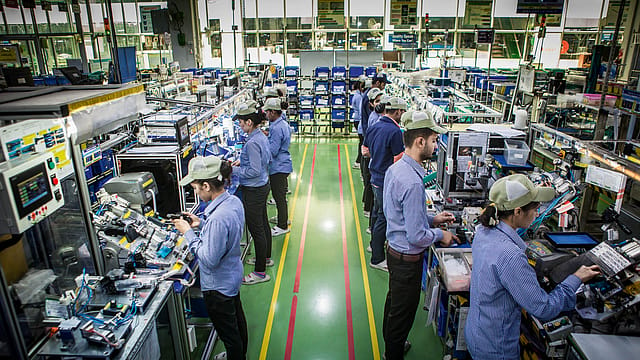India's manufacturing activity expands in February
ADVERTISEMENT

India's manufacturing sector activity expanded for the eighth consecutive month in February due to a faster uplift in new business inflows and sustained sales growth, a monthly survey showed on Wednesday.
The seasonally adjusted IHS Markit India Manufacturing Purchasing Managers' Index (PMI) rose to 54.9 in February compared with 54 in January 2022, signalling a stronger improvement in the health of the sector.
A reading above 50 indicates an overall increase in output compared to the previous month.
Growth has now been seen in each of the latest eight months, with the headline figure remaining above its long-run average of 53.6.
Anecdotal evidence pointed to supportive demand conditions and higher sales to both new and existing clients, the survey said, adding that demand from international clients rose moderately and at the quickest pace for three months.
The upturn was also aided by new orders and an increase in output across each of the three broad areas of the manufacturing sector. Rates of expansion picked up at intermediate and capital goods firms but eased at consumer goods makers, though it remained the best-performing sector in February for the third month in a row.
"Latest PMI data for India's manufacturing sector revealed an improvement in operating conditions in February. Output and new orders expanded at stronger rates, while buying activity continued. At the same time, sustained increases in backlogs could lead to higher employment levels in the months ahead should capacity pressures continue," said Shreeya Patel, Economist at IHS Markit.
Patel, however, cautioned that some key concerns continued to threaten growth. "Most prominently, costs pressures remained elevated as a result of shortages while delivery times lengthened once again. However, a key threat to manufacturers comes from only marginal increases in selling prices. Despite expenses rising sharply, firms passed on only part of this burden to clients, suggesting pressure on profit margins."
For now, India's manufacturing sector has weathered the storm of the Omicron variant, undoubtedly supported by the relatively high inoculation rate, Patel said, adding that demand conditions showed notable signs of resilience and price pressures somewhat receded.
There were some signs of capacity pressures at Indian manufacturers, with backlogs rising marginally, the survey said.
Despite a pick-up in demand, employment fell even as the overall rate of job shedding was only fractional.
Indian manufacturers raised their buying activity in February, in line with higher output and new order inflows, the survey pointed out. "The rate of growth was sharp, but moderated for the third successive month."
February’s survey showed a further increase in average input costs faced by Indian manufacturers. Purchase price inflation was sharp, but softened to a six-month low. Part of this additional cost burden was passed on in the form of higher selling charges, though the rate of increase was modest.
"Input and output price inflation softened at the margin to a six month low, despite a rise in imported price pressures, contributing to the headline PMI gain. However, this may reverse as domestic fuel prices are expected to rise in March," said Madhavi Arora, lead economist at Emkay Global Financial Services.
Business sentiment improved sharply midway through the quarter, underpinned by business expansion plans, a return to normality and hopes for fruitful marketing. The degree of optimism, however, remained below its long-run average.